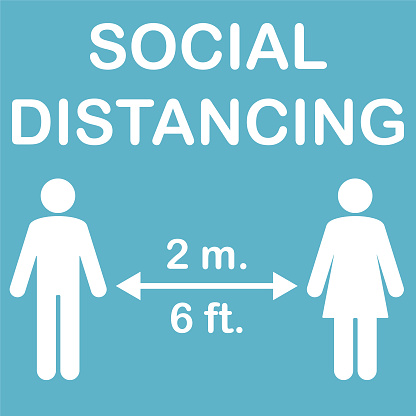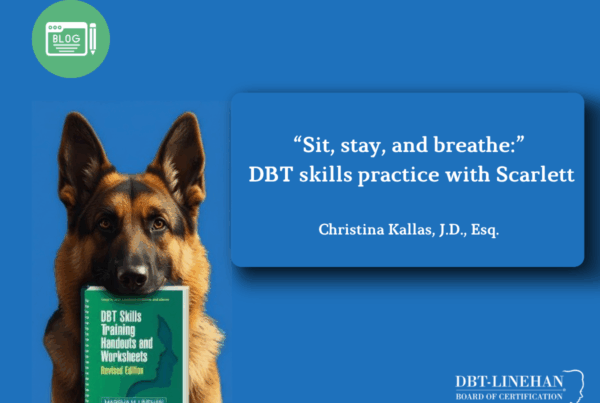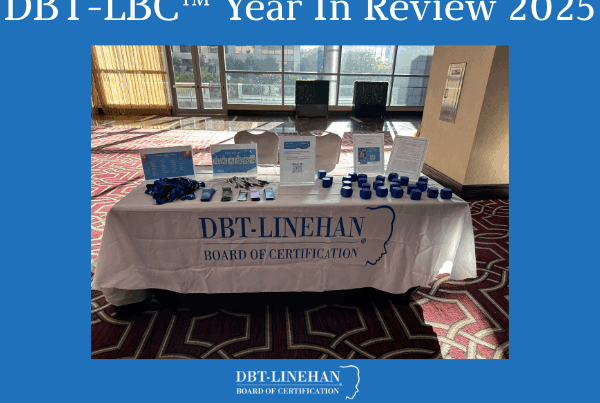As we find ourselves in the midst of a global health crisis, we have all had to find our new norm. With that comes many unexpected challenges that we have not had an opportunity to prepare for. So many of us are faced with the challenge of balancing work and home and creating a system where work can ‘turn off’ and home life can ‘turn on’, which can be challenging when your home becomes your workplace. First and foremost, we all have to remember that what we are experiencing now in terms of stress, fear, anxiety, fatigue and frustration is the new normal and we are not alone.
As our anxiety increases, our threat systems become activated and we may be more vulnerable to emotion mind. What a perfect opportunity to ask yourself “how would I coach my client to respond in this situation?” and use this as an opportunity to model to our clients and family what we all know works, DBT skills. As DBT clinicians, it is more important than ever that we recognize our own vulnerabilities and work to reduce them just like we would coach our clients to do. There is a great deal about this situation that we cannot control and cannot change. How would we coach and support our clients if they came to us with a problem that they have no control over and could not change? We would coach them to practice radical acceptance, to completely and totally accept the situation as it is, acknowledging that their feelings about it are what they are. When you find yourself fighting reality, use self-compassion to acknowledge that you are fighting it and then work to turn your mind toward willingness to do just what is needed in that moment.
DBT-LBC wants you all to know that we are here to support you and provide you with resources that you may find helpful during these unprecedented times. I have found the DBT List Serve to be an amazing resource during this time, so we want to thank all of you that have provided support and resources via that platform. Below are some other important practices that you may find helpful, we all could use some reminders to keep moving forward, especially during a time when it may seem like life has been halted.
We are being asked to “stay home” and practice “social distancing” however we are not being asked to practice “emotional distancing” and with all of the amazing technology we have today this ironically can be a time to get more connected to both those close to you and those that you may have lost connection with.
Routine and schedule are key during this time that may feel so unstructured. Despite working from home or being with children who are schooling from home, the daily routine should stay as routine as possible to provide you, your family and your clients structure and most importantly consistency in daily living. It is important to find a space that can be designated for work and/or school so that at the end of the day you can have a clear separation and maintain a work-life balance. We often don’t realize the little things until they are no longer available. For example, it could be helpful to get up in between each virtual session and take a walk (as if you are walking to the waiting room to greet a client). While this may seem like a small thing, it can help provide separation between sessions. Pre COVID-19, we didn’t sit at a desk without moving in between sessions, so why do it now 😊
Finally, we applaud the resilience of Teams and the way that they have pulled together despite the added stress and strain that moving to telehealth has generated. Additional work hours, loss of Team members, loss of the in-person connection with team members and the normal setbacks that all seem enhanced right now. We are equally impressed with the speed that many of you have adapted to finding effective ways to continue seeing and supporting clients who may be poorly equipped to handle this challenging time, while at the same time keeping the community of providers connected. DBT-LBC is here for you in any way we can be and we are continuing to work on your behalf.
Some things to think about:
- Things will eventually go back to normal, even if that normal looks different than what you are used to; the world is not collapsing; don’t catastrophize.
- You’re tough, you’ve overcome challenges before; this is a new one and can be overcome like all the others
- This is a particularly strange and unprecedented situation; humor helps once in a while
- Remind yourself that your anxiety is normal, and others are feeling the same, there is comfort in numbers
- Live in the here and now, use this time to develop a new mindfulness practice
- Use this time to reflect on the positives of the outside world slowing down instead of the negatives of how it has disrupted the busy world.
- Finally, don’t develop a habit that you will have to work to break.
Other Resources:
- World Health Organization https://www.facebook.com/WHO:
- Center for Disease Control: https://www.facebook.com/CDC
- National Suicide Prevention Hotline is 24/7, confidential and free for people in distress, for prevention and for crisis resources: 1-800-273-8255 or via online chat platform at www.suicidepreventionlifeline.org/chat
- National Domestic Violence Hotline is 24/7, confidential and free for anyone experiencing domestic violence, seeking resources or information, or questioning unhealthy aspects of their relationship: 1-800-799-7233 or via online chat platform at www.thehotline.org/what-is-live-chat/
- National Sexual Assault Hotline is 24/7, confidential and free for anyone who would like to speak to a trained staff member: 1-800-656-4673 or via online chat platform at www.hotline.rainn.org/online
- National Parent Helpline is available Monday through 1 pm to 10 pm to provide emotional support and problem-solving help for parents: 1-855-427-2736.
- WeConnect Health Management is offering free virtual substance use recovery support at www.weconnectrecovery.com/free-online-support-meetings





